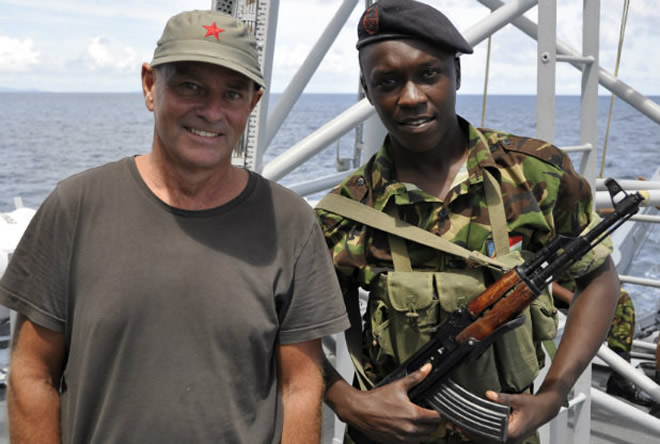
John Boyle with a Seychelles coastguard

Sunday, May 17, 2015
A FORMER Porthleven lawyer has painstakingly researched the story of Somali pirates as part of a global book deal.
John Boyle spent time on warships in the Indian Ocean, interviewed a president, politicians, a UN Security Council ambassador, hostage negotiator and freelance security gun for hire. Most incredibly, he interviewed many suspected Somali pirates themselves.
"A lot of them asked me if I'd seen the film Captain Phillips," he said. "They liked it and said it showed what it's really like."
My Boyle's book, Blood Ramson, was released internationally last week by publisher Bloomsbury.
In 2000 Mr Boyle, now aged 60, sold his law firm, with offices in Truro and Reduth, and became an underwater film-maker.
This took him to the Seychelles where, in 2011, he made a film about Somali pirates for National Geographic.
"That was when the pirate problem was at its height," he said. "I produced that film and out of the blue, Bloomsbury called and said, 'We've seen your documentary. Would you be interested in writing a book?' What could I say? It's a dream come true."
Mr Boyle used material from his film and revisited the islands twice for more interviews and research.
He spoke to the president of the Seychelles, coastguards and officials at the EU's naval force headquarters in Middlesex.
At the time, he said, international attempts to bring the pirates to justice often failed because of restrictions on each country's laws.
"There was no particular international law on piracy," he said. "The nearest laws go back to the times of Captain Kidd.
"What the Seychelles did was change its law to say it would prosecute anyone for piracy that occurred anywhere in the world."
Mr Boyle was given access to a prison housing suspected pirates awaiting trial and convicted men serving sentences.
"They sent me into a courtyard with an interpreter, with barbed wire and watchtowers around," he said.
"For the first day, the inmates were really suspicious. Their first question was, 'Are you from Interpol?'
"By the end of the week, I'd won their confidence and trust. I was bringing in cigarettes and soon had a queue of Somalis waiting to talk to me.
"A lot of them were still waiting for legal decisions and they all said they were innocent.
"Most claimed to be fishermen or immigrants, but their boats didn't have any fishing tackle – just AK47 (machine guns) and rocket-propelled grenades (RPG), which they couldn't explain. They also underestimated the power of aerial surveillance.
"Before the warship even comes into view, these aeroplanes they might not even be aware of were photographing them. They would then be seen throwing their guns overboard. I kept asking them who I could talk to if they were all innocent and in the end I managed to talk to a pirate captain who told me how it was."
He said the origins of piracy were not well publicised but dated back to the past 30 years of political chaos in Somali.
"The seas off Somalia have been completely raped – that's the only word for it," he said.
"You would have had a lot of subsistence fishermen making a living and then you got these great big trawlers from Europe and the East coming in.
"They ripped up the reefs and took everything.
"There was also – and this has been documented by the UN – the dumping of unlawful toxic waste.
"It only came to light after the Indonesian tsunami when barrels washed up on the shore."
He said the Somalis turned their anger against the ships and discovered they could make $10 million or more in ransoms.
Mr Boyle said the operations were soon taken over by organised crime gangs, probably not even based in Somalia.
He said: "These men go hundreds of miles out to sea in small open boats, no bigger than those I can see in Porthleven harbour, and usually crowded with barrels of fuel and water.
"All they have are AK47s and RPGs and just take these massive, modern ships.
"It's hard for me not to have sympathy for them. One Dutch captain I spoke to said, 'you have to admire them'."